Energy Fuels (NYSE: UUUU) - Higher Uranium Prices Inevitable A Sanctions Bite
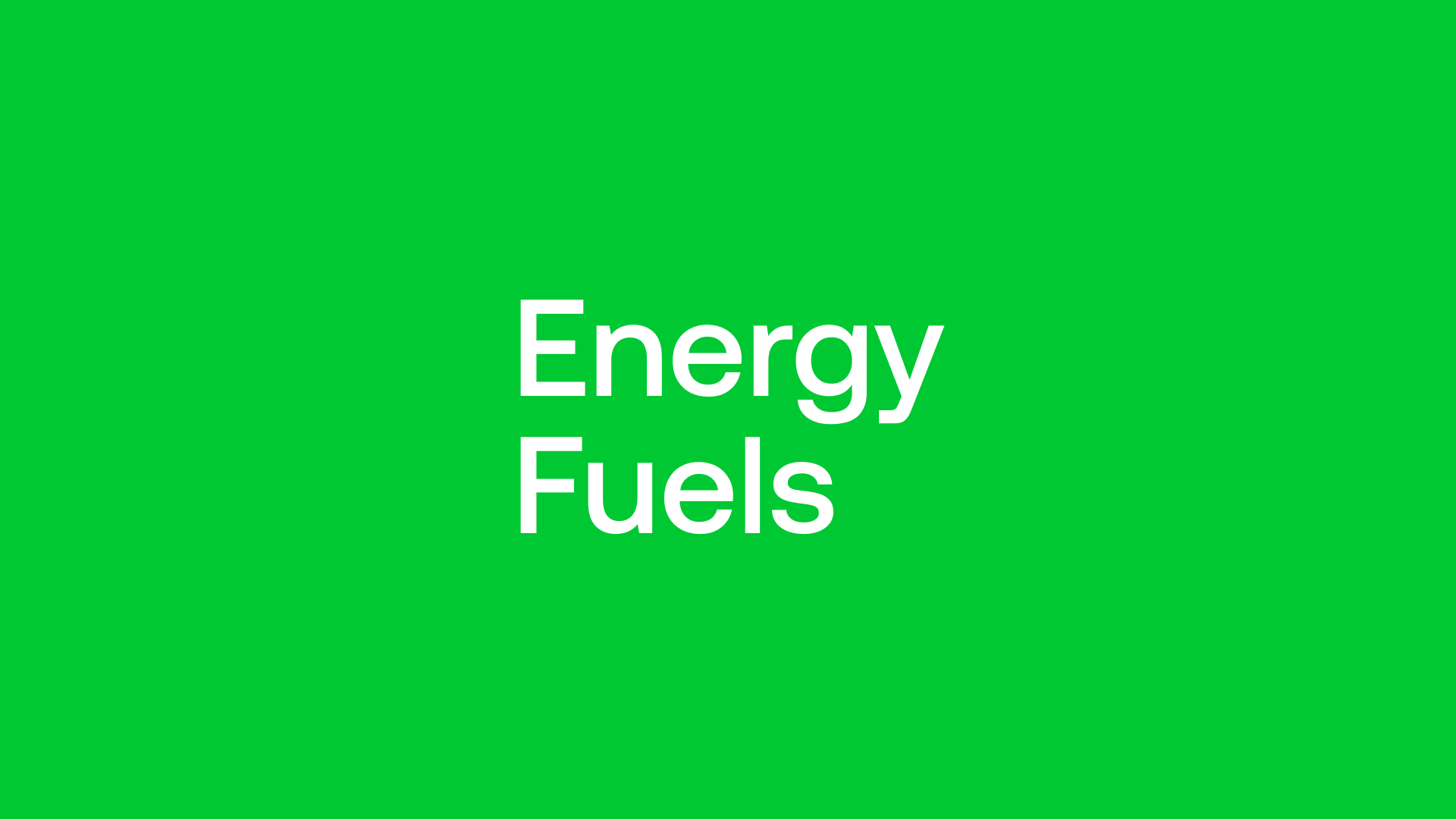
Matthew Gordon spoke with Mark Chalmers the President and CEO of Energy Fuels (NYSE:UUUU)
Energy Fuels Inc. is a leading, US-based integrated uranium producer for use in carbon-free, clean nuclear energy. The company also produces high-grade vanadium which is used in aerospace, steel, chemical industries, and battery production. The company's major vanadium production is the White Mesa Mill in Utah. Energy Fuels is emerging as the largest critical minerals producer in North America with a strong focus on uranium, rare earth metals production and processing, and vanadium production, along with recycling.
Matt Gordon caught up with Mark Chalmers, President, and CEO, Energy Fuels. Mark previously served as an Executive General Manager of Production at Paladin Energy Ltd. Mark has a strong background in situ recovery (ISR) uranium production. He serves as a consultant for BHP Billiton, Rio Tinto, and Marubeni. For the past decade, he has served as the Chair of the Australian Uranium Council.
Company Overview
Energy Fuels is a uranium and vanadium mining, development, and production company. Its main assets are located in the western part of the United States where it owns and operates the only uranium mill in the country. The company was founded in 1987 and is headquartered in Colorado, the United States. It is listed on the New York Stock Exchange (NYSE: UUUU) and the Toronto Stock Exchange (TSX: EFR).
Energy Fuels is a company that focuses on critical materials, particularly uranium, vanadium, and rare earths. The company recently crossed a CAD$2Bn market cap. In 2021, the company made its first profit. It achieved this by monetizing some non-core assets. Other contributing factors include the increase in inventories and market prices for both uranium and vanadium along with the company’s marketable securities. This is a major milestone that has enabled the company to be fully funded for the next 1-2 years.
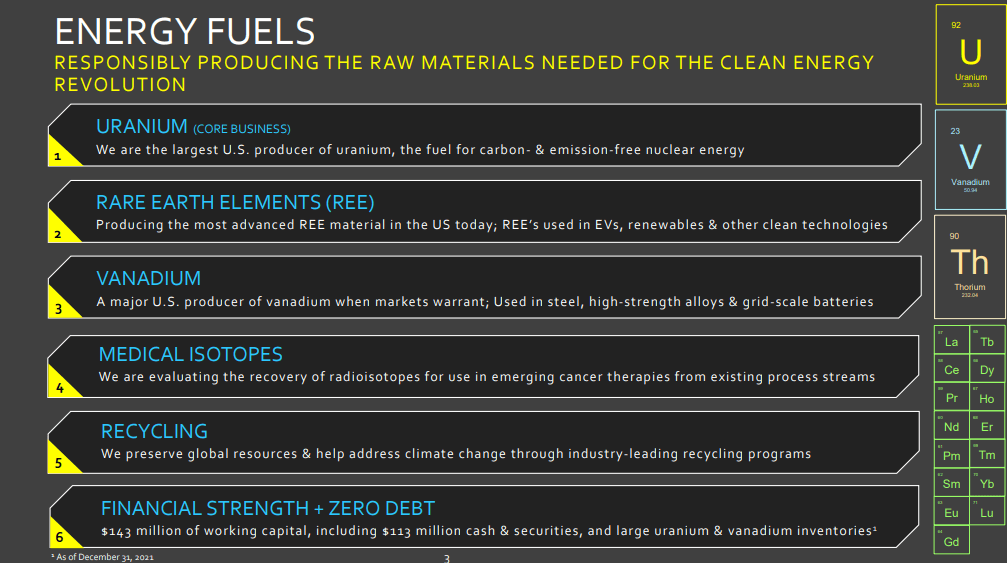
Geopolitical Ramifications
Recent events such as the Russian sanctions have changed the makeup of the market. The world is realising its dependence on Russia and China for a number of critical minerals and other materials. Energy Fuels anticipates that the inflationary environment is likely to catch people off guard. A lot of daily use goods have observed price jumps, which are caused in part by the supply shortages.
Energy Fuels is looking to be a part of the solution by advancing its activities as quickly as possible while being cost-effective. The company is looking to move aggressively, but with caution. It has plans to utilise the balance sheet to opportunistically fill the gaps in the critical mineral supply that is currently being produced or will enter production in the near term.
As per the company, it is evident that the US utility market and other utility markets around the world have become dependent on Russia and Kazakhstan for uranium and other critical materials. However, simply generating a uranium supply isn’t sufficient. In order to solve this problem, uranium supply, conversion, and enrichment should be taken into account. The world needs to have all 3 steps in order to establish an alternate supply chain of uranium nuclear products.
Energy Fuels is gearing up to restart some of its projects. It is actively looking to become part of the solution in any way it can. Although the company has a limited capacity, it has established that its facilities can come online in short order.
Notably, it took years to build the uranium supply chain that is coming out of Russia and Kazakhstan. However, the world needs to realise its over-dependence and start weaning off as quickly as possible, while developing an alternate supply chain.
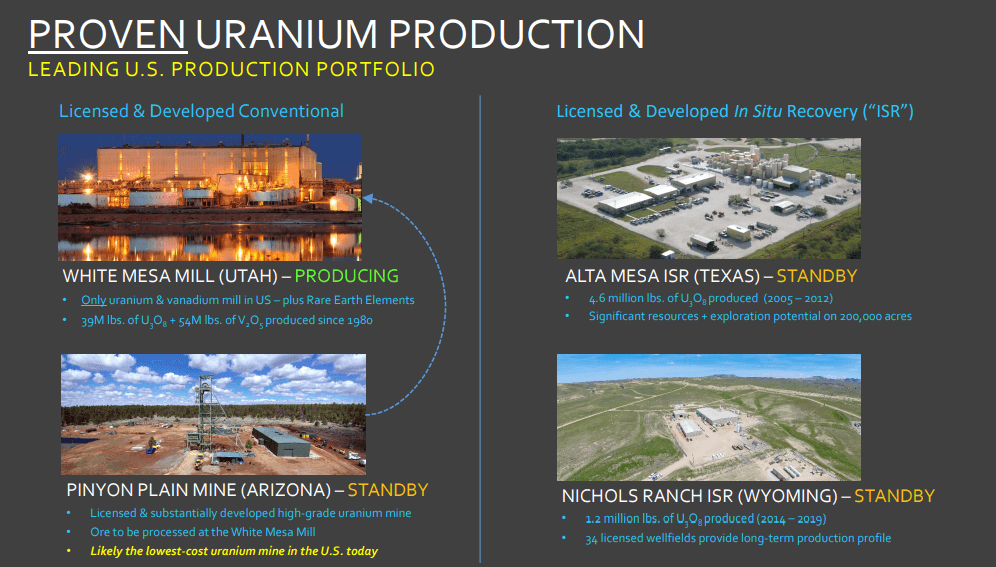
Uranium
Energy Fuels has a long history of uranium production. The company is currently looking at this problem on a plank-by-plank basis. It already has inventories and alternative feed in place. It also has other sources of feed, including the mine. The company’s goal is to build up its production with a certain amount of contracts, which would be feasible for the company. The company is looking to increase its focus on increasing production in 500,000lb yearly increments. In fact, the company is ready to take the first step of securing enough contracts on the downside while ensuring profitability to potentially open 1-2 mines in the future.
Interestingly, 2 years ago, the market was looking at a $55-$60/lb uranium pricing in order to incentivize companies to enter production. The ongoing geopolitical situations, along with other factors have caused inflation. As a result, the costs of entering production have risen dramatically. As per Energy Fuels, a uranium price over $60 would be ideal for most companies to enter production. Some entities can still produce at $50, however, this is rapidly changing.
Given the ongoing inflation in the United States and around the world, there might be a need to add another $10-$20/lb to the uranium price over time in order to maintain a profitable uranium production operation in a dynamic market. The company is already experiencing a rise in the cost of reagents, fuel, and manpower. Additionally, there is an ongoing material shortage that further adds to the problem.
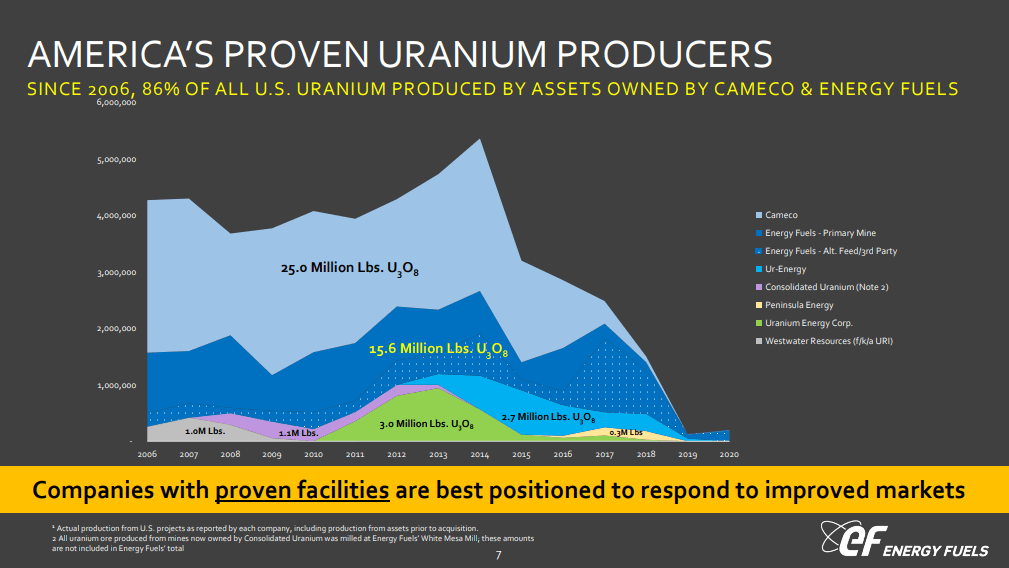
Energy Fuels anticipates that inflation might be temporary. This is because the world can’t perpetuate 5%-10% inflation for 10 years. In that scenario, the costs of every item would need to be adjusted. Everyone is experiencing the side effects of inflation whether they are in the mining business or not.
Newer projects will have a tougher time advancing because the inflation would factor into not only the operating costs but the construction costs as well. Project cost estimates from the past 2-3 years would need to be updated for inflation.
Shareholders and investors are increasingly focused on the ESG (Environmental, Social, and Governance) and corporate responsibilities for projects. This makes it increasingly challenging to rely on or conduct business with countries that are responsible for disrupting peace and causing war. Energy Fuels is looking to work with its customers to bridge the troubling period wherever possible. The company is looking to attain a fair outcome for both parties, while simultaneously building out the uranium space in 500,000lb yearly increments. The company does not currently have large capital construction costs. It is taking a step-by-step approach based on the market conditions and the commercial agreements that are attainable.
It is important for investors to realise that most uranium projects fail. This can be due to the cost of capital or the technical risks that weren’t accounted for. Other factors can include inflationary pressure and a lack of technical skills. A 2008 report by the WNA (World Nuclear Association) said that of all the people that promised to produce uranium, only 10% of the production made it to the market.
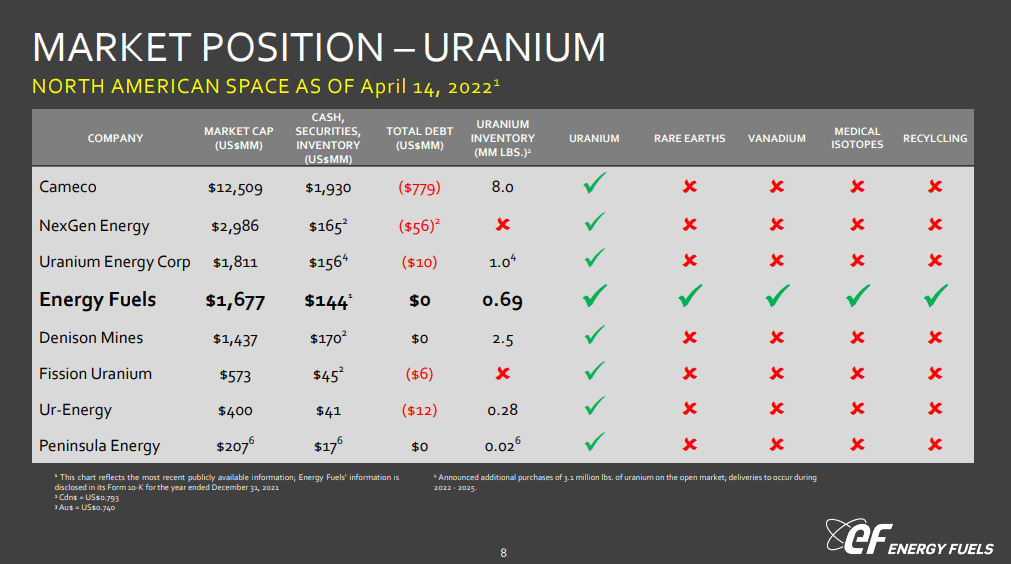
Vanadium
Energy Fuels is currently capturing value in vanadium. The company is selling vanadium at really strong margins, compared to the production costs. The company has the ability to get back into production by recycling some of its tailing solutions. The company also has the option to mine some of its vanadium assets. It has received interest from multiple parties that are looking to secure vanadium for VRFB (Vanadium Redox Flow Battery) batteries.
Similar to the SPUT (Sprott Physical Uranium Trust), Largo Inc, is setting up a vanadium fund along with Sprott Capital Partners LP. These developments show that the vanadium market is healthy.
Energy Fuels has plans to monetize vanadium as the price goes up. At the same time, the company is focused on replenishing the vanadium to maintain an inventory. Given the volatile nature of vanadium pricing, it is important to have an inventory. The company is following the example of the Union Carbide plant, which is known to maintain a substantial vanadium inventory. This allows for the quick movement of material during price spikes.

Rare Earths
Energy Fuels has been active in the rare earths space. The key limiter factor for the company has been in securing additional sources of monazite sands. It currently has the capacity to process 10,000t of monazite sands along with 5,000t of REO (Rare Earth Oxides). The company has signed a multi-year deal with Carester in France to help separate the oxides. Notably, Carester is the world leader in the treatment of monazite sands and the separation of monazite feeds.
The company has been receiving an increasing number of inbound requests from major car manufacturers and trading houses in the rare earth space in order to secure rare earth and vanadium supplies. The company is currently in discussion for securing a monazite sands supply. This is likely to be finalised by mid-to-late 2022. The company is looking to become a world-scale producer of rare-earth products at the White Mesa Mill.

The per-ton pricing on monazite sands can be a limiting factor when securing a supply. Interestingly, the market pricing of monazite sands is determined by the Chinese market. Energy Fuels is currently looking to expand its working relationship with Chemours, a DuPont spin-off company. Notably, one ton of monazite sand of a 50%-60% TREO (Total Rare Earth Oxide) basis at current prices, recovered with separated oxides of the main value chain is worth $30,000. Taking into consideration Energy Fuels’ current processing of 1,000t monazite sand that its currently processing with Chemours, it comes out to $30M of contained rare earth oxides on a very small contract. These figures are based on the assumption that Energy Fuels will go through the separation process, which it isn’t equipped to carry out at the moment.
In phase 1 of the operation, Energy Fuels is looking to source more than 20,000t of monazite sands, which is equivalent to the yearly supply from Chemours. Given the $30,000/t price, sourcing such a supply would require a lot of capital. The company is looking at multiple ways to reach this goal. It is currently in discussion with half a dozen parties that are keen to work on this front.
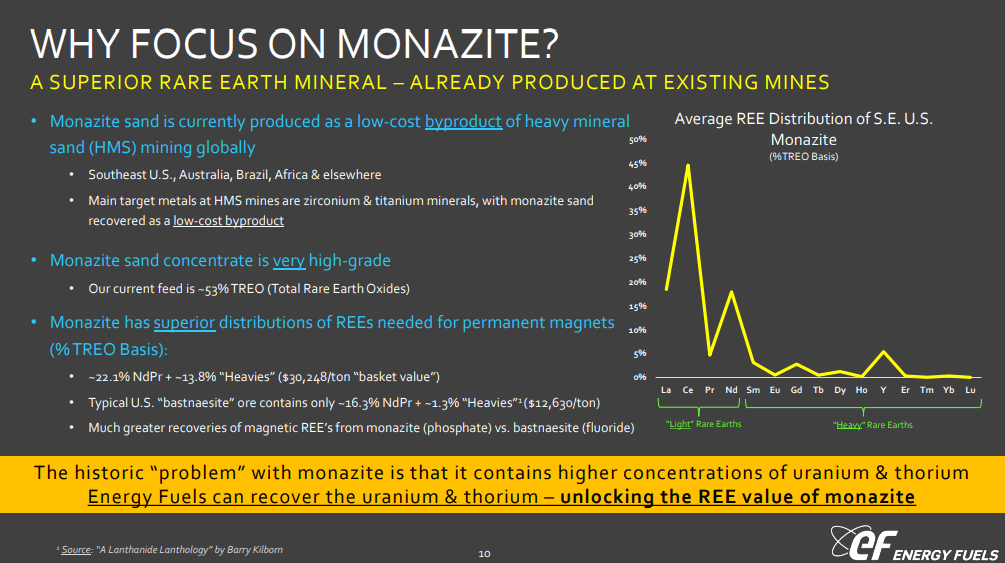
Energy Fuels is looking to secure exclusive rights to the material and offer profit sharing. This would allow both parties to benefit from the deal. The company couldn’t share the specifics at this time as the material source and quality could vastly change the metrics. It is looking at creative ways to show people that it can produce at a world scale while still maintaining high profitability. Energy Fuels seeks to create value and produce sustainably going forward.
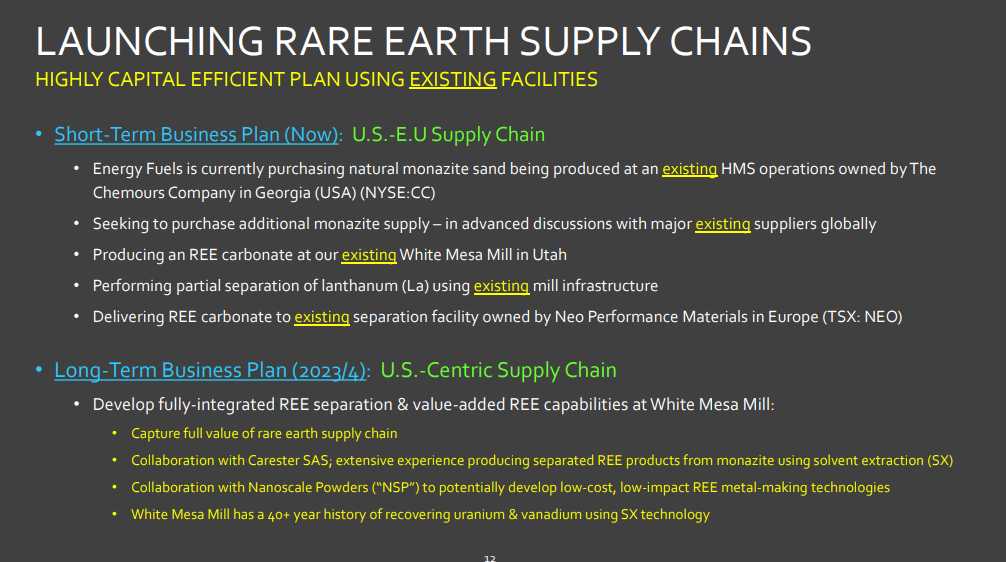
Targets 2022 and Beyond
Energy Fuels surprised the market by making a profit in 2021. The company is looking to repeat the success in 2022 with some of the trades and stocks. The company will prioritise decisions that are best for the shareholders.
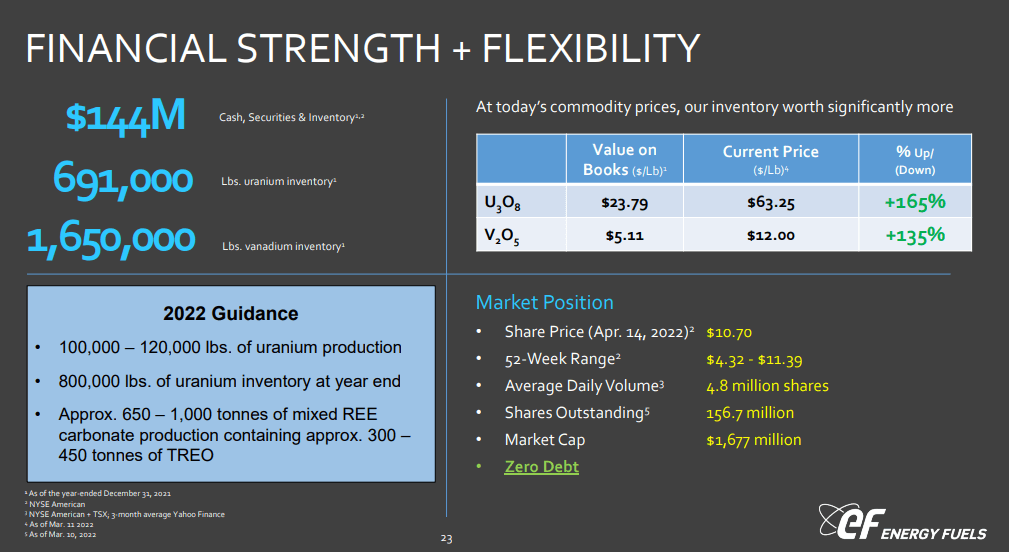
According to the company, rare earth producers and uranium businesses are overvalued in the market. The company is trying to chase the success of MP Evans Group and Lynas, groups with market caps of $6Bn-$8Bn. In terms of REO (Rare Earth Oxide), the company can produce a quarter of Lynas. However, the company would still need to carry out the separation, a problem on which it is actively working to remedy. The company is backed by a highly-experienced and dedicated team that isn’t afraid to go the extra mile.

To find out more, go to the Energy Fuels website
Analyst's Notes




Subscribe to Our Channel
Stay Informed












































